208694
Calmodulin, Bovine Brain, High Purity
Calmodulin is a ubiquitous Ca2+-binding protein that serves as a physiological effector of a wide range of biological processes. Purified from bovine brain.
Synonym(s):
Calmodulin, Bovine Brain, High Purity, CaM, Ca 2+/Calmodulin, CaM, Ca2+/Calmodulin
About This Item
Recommended Products
biological source
bovine brain
Quality Level
Assay
≥95% (SDS-PAGE)
form
lyophilized
specific activity
≥250,000 units/mg protein
manufacturer/tradename
Calbiochem®
storage condition
OK to freeze
technique(s)
cell based assay: suitable
solubility
aqueous buffer: soluble
water: soluble
shipped in
wet ice
storage temp.
−20°C
Gene Information
bovine ... Calm(32659)
General description
Calmodulin (CaM) ranks among the most highly conserved protein sequences, with only histone proteins H4 and H3, actin B, and ubiquitin showing greater evolutionary conservation. CaM is a primarily helical protein with N- and C-terminal domains, each containing two paired Ca2+-binding EF-hand motifs. These motifs, with pentagonal-bipyramidal geometry, feature a conserved 12-amino acid sequence (positions 1–12) within a canonical helix-loop-helix structure.
Application
Biochem/physiol Actions
Packaging
Warning
Unit Definition
Physical form
Reconstitution
Other Notes
Legal Information
Storage Class Code
11 - Combustible Solids
WGK
WGK 3
Certificates of Analysis (COA)
Search for Certificates of Analysis (COA) by entering the products Lot/Batch Number. Lot and Batch Numbers can be found on a product’s label following the words ‘Lot’ or ‘Batch’.
Already Own This Product?
Find documentation for the products that you have recently purchased in the Document Library.
Our team of scientists has experience in all areas of research including Life Science, Material Science, Chemical Synthesis, Chromatography, Analytical and many others.
Contact Technical Service







